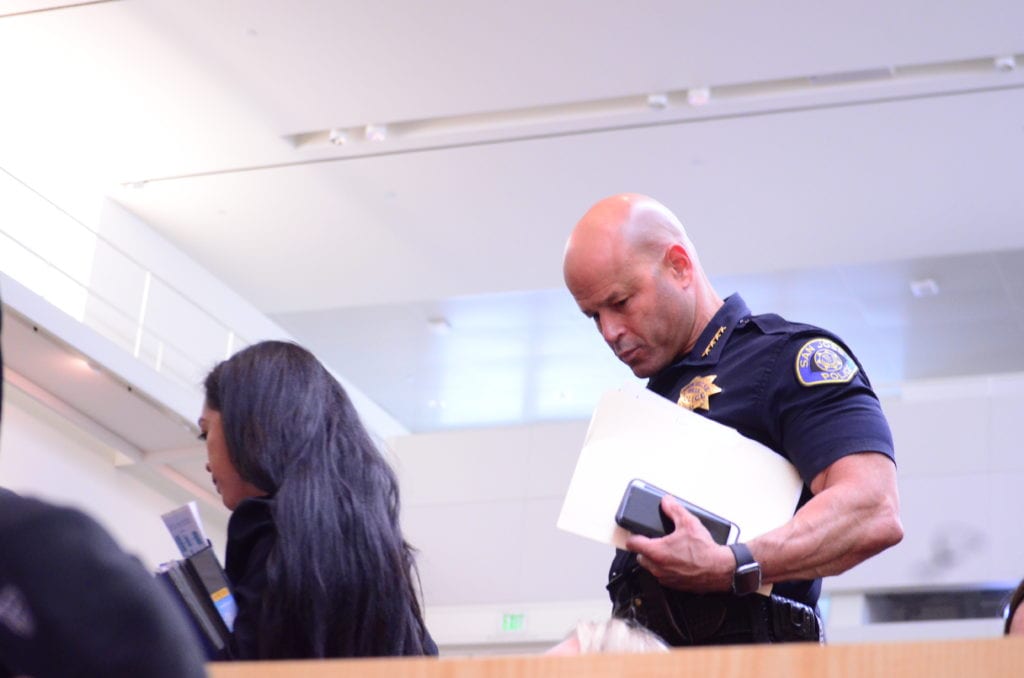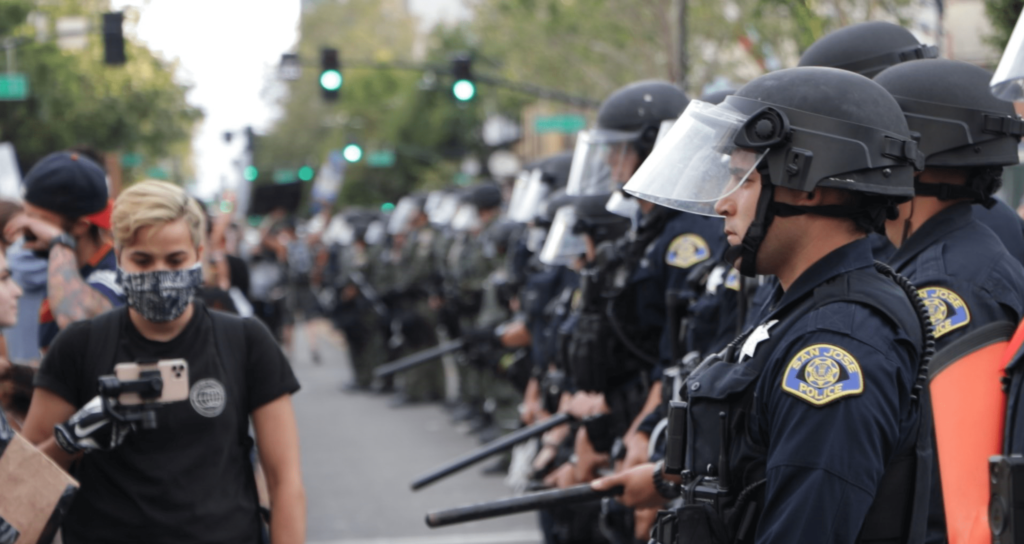Seven law enforcement leaders vying to be San Jose’s next police chief Saturday answered questions from residents about everything from racial equity to biased policing and use of force.
The virtual forum was facilitated by Gary Peterson, who led the recruitment process. He picked a handful of questions from more than 500 submitted through an online survey.
The forum was delayed twice after the city received questions, including from San José Spotlight, about why no external candidates were being considered. The additional time allowed the city to include Justin Doll and Larry Scirotto, two outside candidates, in the finalist pool.
Five of the candidates are either current or former officers with the SJPD, with four of them still with the department: Deputy Chief of Police Anthony Mata, Deputy Chief of Police Heather Randol, Police Captain Jason Ta and Acting Police Chief David Tindall. Jeremy Bowers became Piedmont chief of police in 2016 after a career with the SJPD that began in 1996.
Doll is the chief of police in Anchorage, and Scirotto a retired assistant chief from the Pittsburgh, Pennsylvania Police Department.
Four of the seven candidates are people of color, and Randol is the only woman candidate.
The city is looking to replace former Police Chief Eddie Garcia who retired in December. The selection of a new chief comes after much turmoil for the San Jose Police Department, including racist Facebook posts, excessive force complaints and officers targeting and taunting peaceful protesters.


Racial equity
The forum opened with each candidate explaining how they’ll address racial equity and systemic racism in policing. They all agreed that law enforcement has a role in promoting equity, and vowed to work to reverse the culture in the department. They also pledged to create more racial bias training to ensure all residents are treated equally.
Mata pledged to work with groups, such as SOMOS Mayfair and Silicon Valley De-Bug, as he’s been doing as deputy chief.
“Through these partnerships, I have been able to identify barriers and limitations and made the necessary changes to policy and procedures so that we provide just and equitable services,” Mata said.
Randol, the first woman to lead the SJPD detectives bureau, said acknowledging bias exists in the brass is the first step.
“We have addressed crime without considering the wider impacts it has on communities,” she said. “And that’s something we have to look at and consider. We, the police department, can no longer ignore our role in contributing to this current situation.”
Scirotto agreed, saying that some officers might not be familiar with how some police policies originated in the Jim Crow era.
“But community members are very aware of how they’ve been treated and have a lived experience in that environment and that level of trust is diminished because of it,” he said.
Quality-of-life crimes
The candidates agreed on the importance of working with mental health professionals to deescalate crisis situations and promised to incorporate technology in policing.
“We know that not every call requires a police response,” Mata said. “This is one way to create efficiency.”
Bowers meanwhile said reducing response times would mean quality-of-life crimes, such as car break-ins, can be stopped.
“I would convene a workgroup to get together to … look at our responsiveness,” Bowers said. “Looking at our priority dispatching, the capability of it and its performance.”
Accountability and discipline
The candidates said they’re aware of public outcry following the perceived lack of discipline for officers who have been accused of police brutality in other cities. They also wanted to ensure that officers are able to speak out against discriminatory behavior from their fellow officers without the fear of retaliation.
Randol and Mata would ensure officers have an easy way to report fellow officers should they overstep their role. Ta wanted to prioritize disciplinary issues when they come up and resolve them in a “timely” and thorough way.
Scirotto recalled a time when he had to reprimand an officer who bullied a teen, promising to do the same if an SJPD officer was caught abusing his power.
“There is a difference between making a mistake of the mind and a mistake of the heart,” said Scirotto. “We took action to set an example for what is right and just that no officer is ever going to be above and beyond the profession and that immoral, unethical, unlawful behavior will be punished severely.”


Tindall wanted to ensure that no bad actors will be employed by the SJPD.
“Instances like George Floyd’s murder have marred the public’s trust in us. But I will continue to push for changes in arbitration so we can get transparency and accountability,” Tindall said.
Improving relations between the community and police
Peterson asked many questions about how the police engages with the public and building bridges between residents and the police. One idea included using multilingual officers for outreach.
“There’s no secret recipe to connect with marginalized communities,” Ta said. “But if you don’t have these connections, these conversations, you’ll never improve these problems you see with ineffective communication.”
The city’s new police chief will take the helm of a department that has been criticized in recent months after its handling of San Jose’s George Floyd-related protest in May.
“Every single time any member of the police department … has a contact with a member of the community, that is an engagement and relationship-building opportunity,” said Doll. “It’s really incumbent upon the chief to set that tone for him or herself, but also all the way down through the entire organization.”
Recruitment and retention
Officials have lamented in recent weeks that the number of police officers are dwindling.
Candidates pledged to encourage more San Joseans to apply to become cops and push to recruit officers from different racial, religious and economic backgrounds.
Ta said the department must do more to hire mid- to high-level officers of color.
Tindall said he would convene a workgroup working with the city’s Office of Racial Equity. Sciotto said he was proud of hiring diverse officers in Pittsburgh, including the department’s first transgender officers.
Next steps
Earlier this week, police leaders announced exploring the use of “less lethal” weapons in place of guns.
Still, some say more needs to be done.
“The protests reflect mass imprisonment and other structural problems, so changing one institution isn’t going to be enough,” Paul Knepper, chair of the Department of Justice Studies at San Jose State University, told San José Spotlight. “Making change happen on the scale we need to deal with will require all of us collaborating in ways we really haven’t done before.”
City Manager Dave Sykes announced the candidates will be interviewed by several community organizations and city officials in the coming weeks. The chief will be selected in mid-March.
The forum can be viewed in its entirety here.
Contact Lloyd Alaban at [email protected] or follow @lloydalaban on Twitter.
020921CMOChiefofPoliceRecr



Leave a Reply
You must be logged in to post a comment.